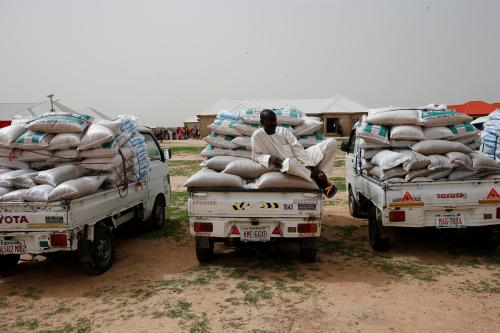Post-election updates in Côte d’Ivoire, Guinea, and Tanzania
On Wednesday, November 11, Côte d’Ivoire’s newly reelected President Alassane Ouattara met with one of the country’s main opposition leaders, Henri Konan Bedie, in an attempt to avoid a crisis in the West African country. Last month, alongside another opposition candidate, former Prime Minister Pascal Affi N’Guessan, Bedie had called on his supporters to boycott the controversial election that has seen violence on either side of it. After the meeting with Ouattara this week, Bedie stated that the two men “have broken the wall of ice, of silence,” and that the two would continue to meet in going forward. N’Guessan, on the other hand, was arrested on Saturday for attempting to form a rival government. According to al-Jazeera, Ivorian prosecutors are also pursuing “terrorism” charges against more than a dozen of N’Guessan’s supporters.
On Sunday, November 8, Guinea’s constitutional court confirmed the reelection of President Alpha Condé for a controversial third term despite reports of irregularities and preelection restrictions on border crossings and internet and phone usage. The reaction from the international community to the election results has been variable, with neighboring countries and China largely recognizing Condé as the winner while the United States and France, among others, have expressed doubt. Protests against the results have continued since the election, with some ending in violence. On Wednesday, security forces arrested over 100 activists opposing the results, including the vice president of the country’s leading opposition party.
Meanwhile, Tanzania continues to face postelection disputes. On Tuesday, November 10, United Nations High Commissioner for Human Rights Michelle Bachelet released a statement saying she was “disturbed by reports of continued intimidation and harassment against opposition leaders and members” and that “at least 150 opposition leaders and members have been arrested since 27 October in mainland Tanzania and in Zanzibar.” The majority of those arrested have been released. Meanwhile, also on Tuesday, Tanzanian opposition leader Tundu Lissu left the country for Belgium. Lissu had been staying in the residence of the German ambassador to the country in the wake of his October election loss and subsequent arrest by Tanzanian authorities for calling for protests of an election marked by irregularities. While after the election he stated that he fears for his life, Lissu, who was the victim of an unsuccessful assassination attempt in 2017, has emphasized that his departure is not him “fleeing the country,” but, rather, leaving for medical treatment.
Ethiopia’s brewing conflict deepens
Instability and fighting in Ethiopia’s Tigray region continued this week, resulting in the deaths of hundreds and the displacement of thousands. Since Ethiopian President Abiy Ahmed announced on November 4 that communications were cut and that troops had deployed to Tigray, around 11,000 people–half of whom are children–have fled the country to Sudan, according to the United Nations High Commissioner for Refugees (UNHCR). The U.N. also indicated that blocked communication and road closures were complicating relief efforts, including delivering food and health-related products.
Though Ethiopian Foreign Minister Demeke Mekonnen said Friday that the conflict will conclude “in a very short period of time,” NPR notes that some worry that a prolonged conflict could destabilize the security of the region. Firsthand reports of violence from the direction of Eritrea have not assuaged the fear that Eritrea, which remains at odds with Tigray’s ruling party, could be drawn into the conflict only two years after reaching a momentous peace agreement with Ahmed’s government. In addition, experts worry too that the conflict in Tigray could divert Ethiopian troops away from operations combating militant groups in Somalia. Moreover, the African Union (AU) fired its head security official, Ethiopian native and Tigrayan Gebreegziabher Mebratu Melese, following complaints by the Ethiopian government that he was disloyal to the country.
Nigeria ratifies the African Continental Free Trade Agreement (AfCFTA)
On Wednesday, Nigeria ratified the AfCFTA, according to the country’s Federal Executive Council (FEC), the 31st country to do so. The endorsement of the agreement by the continent’s largest economy is an important step in realizing the free trade zone, which will ultimately cover 1.3 billion people and $3.4 billion in economic activity. Nigeria had been mulling over the decision to ratify as it considered complaints from local businesses that the free-trade arrangement would result in an influx of Chinese and European goods via other African countries, thereby dampening domestic competition.
Despite ratifying the free trade agreement, Nigeria announced it will keep its land borders with Benin, Cameroon, and Niger closed in an attempt to curtail the smuggling of agricultural products. It remains to be seen whether Nigeria will change its border policy before the AfCFTA goes into effect starting January 1, 2021. Notably, while 31 countries have both signed and ratified the agreement, 23 others have signed but not yet ratified it. Eritrea remains the only country in the African Union that has not signed the AfCFTA.






Commentary
Africa in the news: Post-election updates, Nigeria ratifies AfCFTA, and continued unrest in Ethiopia
November 14, 2020